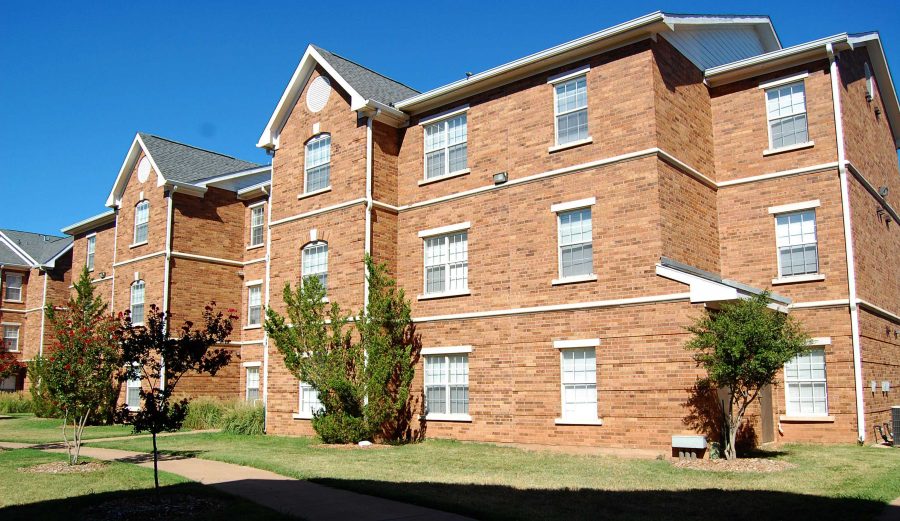For Michael Mills, director of housing and dining services, accommodating the students in the on-campus residence halls came down to simple math. He said 771 new students requested university housing. Almost 600 returning students requested on-campus housing. With only 1,320 on-campus beds, he had to find room for nearly 100 students.
“We had 771 new students who requested university housing,” Mills said. “As you can see, when you add those up, we had more requests for university housing than we physically had beds for.”
The solution: The Grove, an apartment complex about 1.5 miles away.
“We responded by leasing as many completely open three-bedroom, three-bath apartments at The Grove, which totaled 31 units and 93 beds,” he said.
According to Mills, all of the students who lived in university housing last spring had the opportunity to renew their contracts back in April, some 590 students. Although some of them did not return to campus, he also had to accommodate new students, some of which could not be processed since Aug. 29 was the last day to register for classes. Housing officials assigned students to housing based upon the date of their housing deposit, which in essence is first-come, first-serve.
And Mills said they expected to receive a few complaints.
“We have tried to make the best of a bad situation,” Mills said. “For instance, we have added a Mustang’s Shuttle bus stop at The Grove, so that our students can ride the bus back and forth to class. We have also placed two of university housing’s RAs in the complex to help with the connection to campus and to assist the students with anything they need.”
Further, Mills said that housing staff members have worked to connect those students living in The Grove to the campus.
“We have done many things to try and minimize that concern, most importantly, putting housing RAs in the The Grove,” he said. “These RAs regularly meet with their residents and conduct programs and events for the residents at The Grove. “
Kimberly Nowell, a resident assistant at The Grove and senior in education, said some freshmen residents have mixed emotions about living away from the main campus, but most of them do like it because the apartments have more privacy.
“I love it (living at The Grove),” Nowell said. “I’ve been living in Killingsworth since my first semester, so this is fantastic. There’s a door to my room, a big closet, and I have my own bathroom.”
Nowell said she hasn’t really gotten any complaints from freshmen residents and that students seem generally happy.
“We are all getting to know each other,” she said. “But we are all neighbors, and we are working to form a really close-knit group.”
According to Nowell, the RAs conduct their own programs at The Grove to help students feel more connected and take every advantage of resources available to them at the apartments to help student residents interact.
“We do movie nights. We just had a ‘Walking Dead’ party,” Nowell said. “This month we are planning a pool party and a big barbecue. We also use the basketball courts, and the pool is huge.”
Ultimately, Mills said he hopes students are finding ways to stay involved with university life and he hopes to get them back to campus just as soon as physically possible.
“It is our goal to have everyone back on campus by the start of the spring semester,” he said. “However, I would encourage any student who feels disconnected to reach out to either their RA or the housing office and we will do our best to help them.”
While Mills said they are working to accommodate students, he said despite enrollment decreases in the last few years, university housing has doubled its campus occupancy over the last 10 years and housing officials are looking at when it is time to build more residence halls.
“It is too soon to run out and build a new residence hall until we have a better understanding of the enrollment trends for the next couple of years,” Mills said. “The last thing we want to do is build a new residence hall and it not have enough demand. That is why in the interim (until we have a few years of enrollment trends) we will continue to look for alternative ways to house residents.”
University housing is built using rent monies. Housing does not receive income from either tuition or student fees. So, to fund a new residence hall, the housing department would request for bonds to be issued, which would be repaid over a period such as 30 years. Those payments, along with expenditures needed to run the facility, would come from the rents paid by the students who live in the building.
“So we would have to make sure that if we built a 400-bed residence hall and that we had 400 students that need and want those beds,” he said. “If we were to build a 400-bed residence hall and only have 50 percent occupancy, that would be a financial problem for the university.”
Residence hall overflow moved to The Grove from MWSU Campus Watch on Vimeo.

















